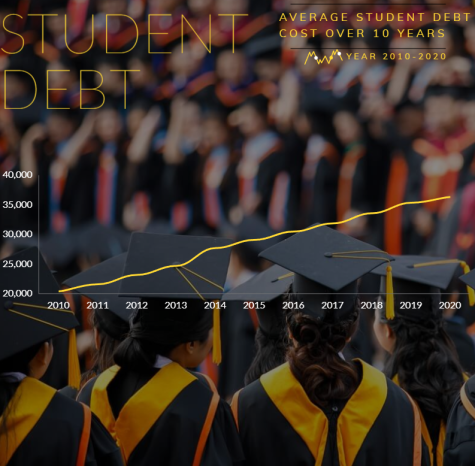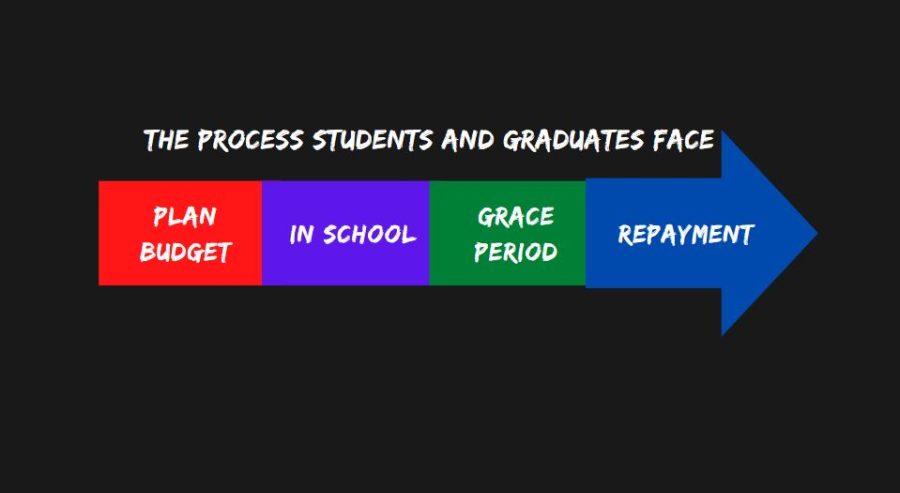Your donation will support the student journalists of North Cobb High School. Your contribution will allow us to purchase equipment and cover our annual website hosting costs.
Student debt ruptures the dreams of graduates
December 13, 2022
With high school students constantly wanting to attend their dream college, backlash occurs after attending due to the massive student debt they endure. The majority of high school students strive to succeed in college; they aim to receive loans and attend high-cost private schools such as Stanford, Duke and Harvard. The average cost of college tuition, room and board for the 2021-22 academic year ranges from $25,707 (4-year, public, in-state) to $46,950 (4-year, private). College students or recent high school graduates cannot afford six-figure tuition for four years of college. Even if students acquire help from their parents, a small percentage of Americans can afford a price tag without owing any student loans at all.
Over the years, the balance per borrower increased by 25% from 2009 to 2021, according to the U.S. News and World Report. Students borrow increased funds because college tuition has grown times faster than average income. The cost of college and resulting debt, excels higher in the United States than in other wealthy countries like England, France and Canada, where higher education remains free.

Students who rely on loans for college interfere with the beginning of their early adult life. College education allows students to earn additional money over their lifetime than someone with only a high school diploma. However, depending on the amount the student borrows, it could throw students in a loop for the first few years out of college. Millions of college graduates struggle with finding a job that pays enough money to allow them to live a decent life.
“Due to my financial situation, I had to put my loans in forbearance because I am living on a social worker’s salary trying to live with at least the basics such as clothing, food, shelter and transportation. It’s definitely been a struggle and I have tried to find help with getting debt relief, but they want you to pay down your loan so far. But who can do that with a loan payment that is just about as much as a mortgage payment? The interest alone is out of this world and makes it even harder to pay. I am hoping to one day pay the loan, but I do not think that it will be completely paid off in my lifetime; it’s just too overwhelming,” social worker Lisa Hamilton said.
Paying off student debt delays the dreams of graduates and puts people into lifetime debt. Students go to college to increase the economic ladder and set themselves up for successful adulthood. 85% of student loan borrowers say difficulty in saving delays their ability to buy a house, and other research indicates that those with student loan debt will less likely take out car loans. They will obtain worse credit scores and will predictably live with their parents. Earning a postsecondary credential can make a difference in securing a job that offers a long-term career and financial security. However, this does not serve as a guarantee to every student. Sometimes, the weight of loans can set students back further financially from where they started. Almost 40% of student loan borrowers leave college with debt and no degree due to a lack of planning and no motivation to continue.

“The average monthly student loan payment in 2018 is $351. But many college graduates find themselves paying higher amounts, especially those who had to take out private student loans. It depends on how much debt there is relative to how much you earn and whether you are simply looking at the financial impact. It will be a much greater burden on your financial situation if you go into a less lucrative career (such as teaching). The key is being disciplined when deciding how to spend your income. This money can be used for other payments towards life, saving for a down payment on a house, paying off regular debt, or investing for your long-term financial goals,” AP U.S. Government and Microeconomics teacher Steven Butler said.
In the past thirty years, college tuition has doubled exceedingly. However, new data shows that students still believe in the native value of going to college. While young adults should still attend college for better employment opportunities and to develop lifetime skills and lifetime connections. College allows people to set goals and follow the career/major they applied themselves to. College offers degrees for multiple years of studying in the chosen major. This helps remarkably towards the chance of employment and expands the horizon of jobs. Students sharpen a wide set of skills and abilities through the college experience. College can enrich feelings of independence and control, as well as teach the necessity to plan one’s time and make reasoned decisions. These types of skills and abilities become must-haves when it comes to dealing with life in the real world.
“There is ample evidence showing there is a strong correlation between how much education one has and their salary. More education equals more money. Beyond that, there are many occupations that require a college education. In other words, one would be shut out from opportunities without a degree. The greatest benefit of college would probably be to people who have a love of learning and earn a degree that allows them to pursue a career in an area that they are passionate about. On the other hand, college wouldn’t have great value if an individual isn’t crazy about learning/school in the first place and ends up in a career that doesn’t require a college education,” Butler said.
When applying to colleges during high school, students need to plan a budget so they do not experience severe debt. The road to reducing student debt begins with communication between the parents and the child. Before high school, parents should discuss with their children how they plan to cover college costs and the amount they can afford to contribute. The majority of parents, even those who have saved for college, struggle to cover 100% of college costs. This will affect the types of schools a student decides to target. Students become so attracted to the few dozen brand-name colleges the media loves to promote, that they will take out an unreasonable amount of student debt. However, while the top 50 colleges may offer distinct advantages to attending, dozens of other colleges can also provide students with a top-notch education and access to great job opportunities. While in school, studies intend to reach top priority. College grants students time to come up with the money; students possess the option to pay their student loans, which will save them money in the long run due to less interest. After leaving school, the college grants graduates six months before they need to begin making payments, collectors call this a grace period. Students then receive a payment schedule to start paying their student loans.

